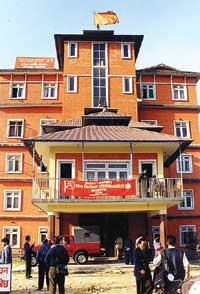 STOCKHOLM - It's election time in Sweden, but you wouldn't be able to tell. Loudspeakers don\'t blare election slogans, and there is no visible door-to-door political canvassing. Posters of tastefully dressed candidates look down at pedestrians, but they look more like models for designer business suits. Even on the front pages of daily newspapers, election issues do not get as much prominence as other stories. People on the street are aware that they are going to polls on 15 September, but nobody seems to be too concerned.
STOCKHOLM - It's election time in Sweden, but you wouldn't be able to tell. Loudspeakers don\'t blare election slogans, and there is no visible door-to-door political canvassing. Posters of tastefully dressed candidates look down at pedestrians, but they look more like models for designer business suits. Even on the front pages of daily newspapers, election issues do not get as much prominence as other stories. People on the street are aware that they are going to polls on 15 September, but nobody seems to be too concerned. The reason for such apathy may be the predictability of the outcome in Sweden. Like most other developed countries, predictions of opinion polls are fair indicators of voters' preferences, and nobody is expecting anything new from the general elections next-week. The front led by Social Democrats (consisting of the Left Party and the Green Party-conservatives call them The Reds) is likely to remain in power, though with even lower margin. The vote on Sunday would be routine, with no electoral upsets expected.
The Swedes are surprisingly consistent in reposing their faith in the party of their choice. With the exception of one brief episode, Social Democrats had been in power for 44 consecutive years between 1932 and 1976.
Conservative coalitions do not last long. But sadly, some younger Swedes seem to hold a strange fascination for fascism and want a government that is stricter on immigrants, conservative about imports from European Union countries.
Rightists are not yet a significant force, but given the swings in France and the Netherlands, who knows what will happen as Sweden further integrates with the EU? Swedes are holding on to their Kroner for now, and adopting the Euro is sure to be deeply divisive. This is the fear that haunts committed social democrats here.
The tradition of holding both national and local elections together is now being hotly debated. There are people who hold that local and national issues tend to get mixed up in simultaneous elections. But this Sunday, it will be like any other elections in the past-6.6 million registered voters can vote for local government units and the national parliament. Sweden abandoned the bicameral system in 1971, and the Riksdag with its 349 members, is the single house now.
Perhaps there is a lesson here for us in Nepal-do we really need an upper chamber where the likes of Diptaprakash Shah are members? Even though individual members of the Riksdag have complete control over their own vote-theoretically, they can vote against their party directives though such a thing rarely happens-it is the political parties that are at the core of the Swedish parliamentary system. Voters choose the party that they want to represent them. If they have strong reservations against a certain candidate, they have a right to tick against that particular name in their vote. But essentially, it's the political parties that decide the composition of the Riksdag. This arrangement may be the reason why the Swedish parliament is the most gender-balanced in the world with 43 percent women.
 There are seven recognised political parties in Sweden. (That mature democracies ending up with two-party systems is evidently a myth). The social democrats are the architects of the welfare system, where high taxes and free services go together, and the system works so well it has few parallels in the world.
There are seven recognised political parties in Sweden. (That mature democracies ending up with two-party systems is evidently a myth). The social democrats are the architects of the welfare system, where high taxes and free services go together, and the system works so well it has few parallels in the world. As in past elections, the issues this time are once again education, health and the care for the elderly. Unemployment is low, and promises of tax cuts do not appeal to voters. They are loath to give up the privileges guaranteed by the state-free education, free health care, and a blanket social security system for all. Such a welfare system is largely financed by the trade surplus that Sweden has with its trading partners, but efficiently managed state enterprises and cooperatives are no less responsible for the quality of service available to all citizens irrespective of financial standing.
Social democrat Swedes bristle when asked if their system is inherently Marxist. But this is a system that the young Karl Marx (rediscovered by some American scholars) perhaps had in mind all along. This is an interesting example for our pink comrades in Balkhu to emulate. In 1990, the Swedish Communist Party changed its name to the Left Party, and has been doing rather well ever since.
Last month, our own Communist Party of Nepal (United Marxist-Leninist) got a scathing press for hiding the portraits of The Five Wise Men when the American ambassador visited the Balkhu Palace. Soon after, Comrade Madhav Nepal invited some buddhijibis for consultation. The portrait episode wasn't discussed, but someone did suggest that if the CPN (UML) changed its name to Nepal Social Democrat Party, nobody would be able to stop it from coming to power again.
Comrade Madhav Nepal's reaction to that suggestion was typical bourgeoisie-he defended his party's name by comparing it to Coca-Cola. But if brand-building was the issue, then the word "communist" has been hijacked by the Maoists. The UML should take a study tour of Sweden to see how the reds did it here.



